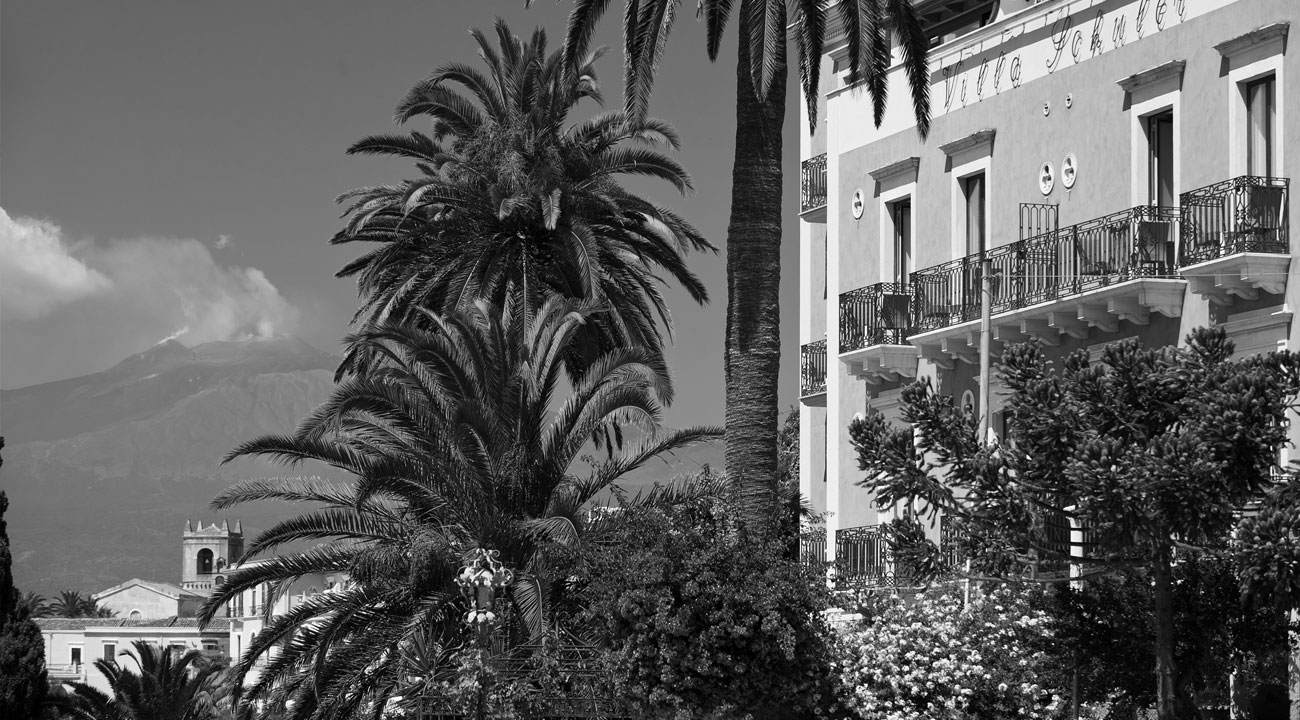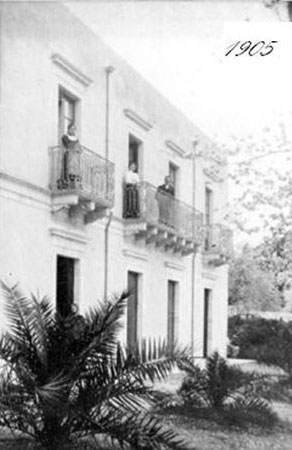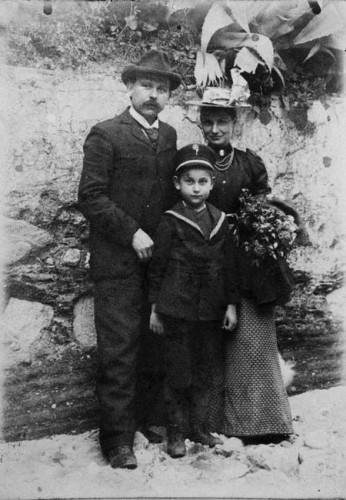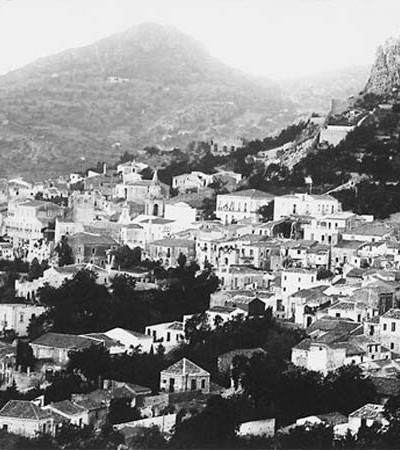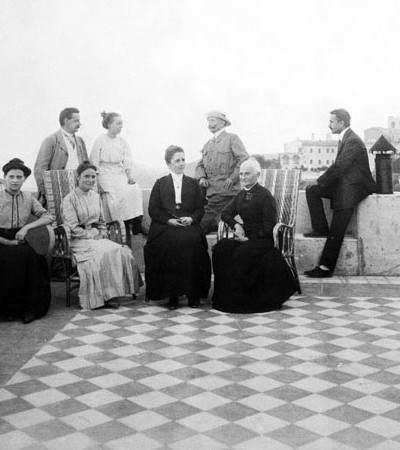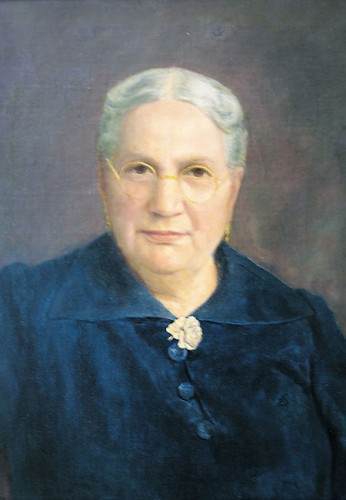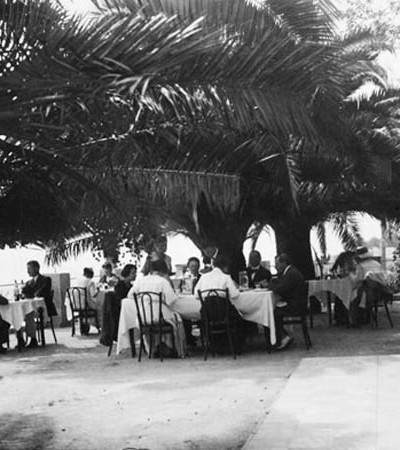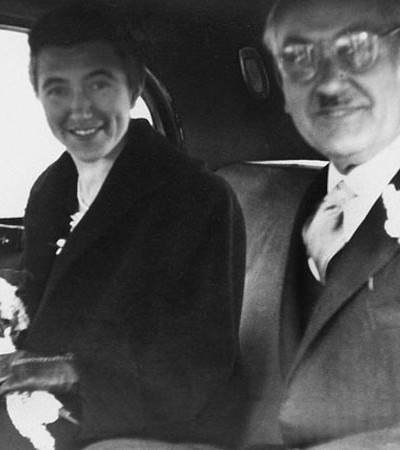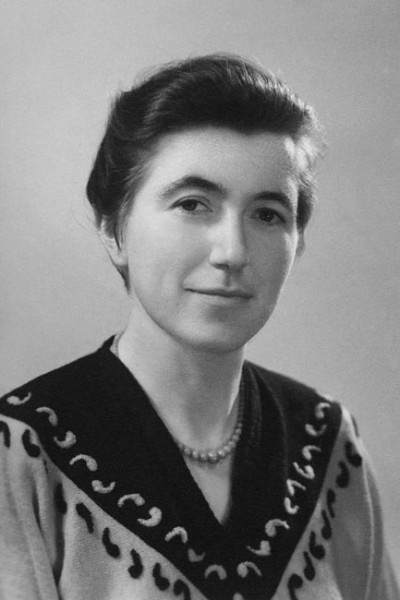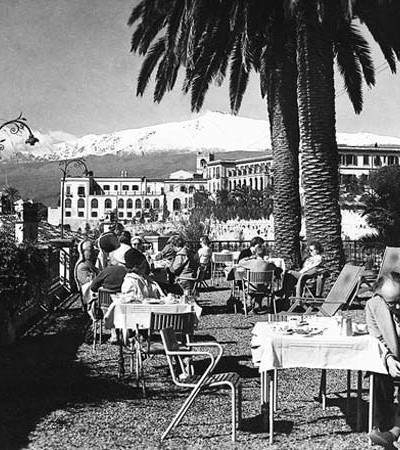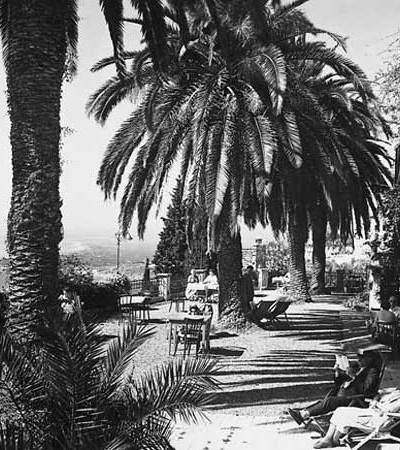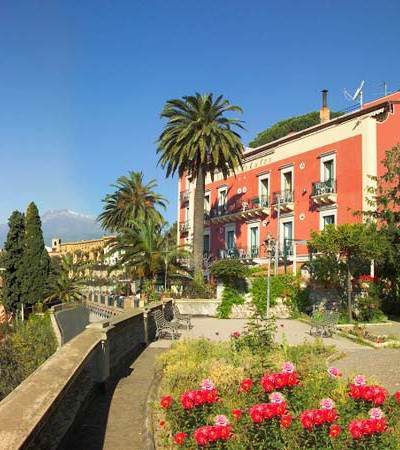历史
THE HUNDRED-YEAR HISTORY OF VILLA SCHULER
Dear guests, hello and welcome to “Villa Schuler”! Allow us to introduce ourselves: We are Alessandro and Andrea Schuler – the great grandchildren of the hotel’s founder. We probably haven’t met you yet, because we only help out occasionally here in “Villa Schuler”. As for me, Alessandro, I am studying “scienze per la comunicazione internazionale” (International Communication) at university in Catania. My brother, Andrea, is still attending the “liceo classico” (high school) in Taormina. Our father, Gerhard Schuler, runs the hotel where you are staying and, hopefully, having a wonderful time!
Much of our childhood was spent in the house where you are now our guests.
Children don’t particularly notice whether or not the surroundings they happen to be living in are special. We took this magnificent place for granted, as if things could never have been any different. Only later did we come to realize just how special the place is. And “Villa Schuler” has a really extraordinary history. Standing on the hotel terrace beneath palms that are as old as the hotel itself, namely a proud one hundred years, you can enjoy the splendid panorama of the Bay of Giardini-Naxos, Mount Etna and the romantic Giardino Pubblico. Originally nothing grander than a private home with some exhibition rooms for antiques was planned on this site. But things were to turn out differently…
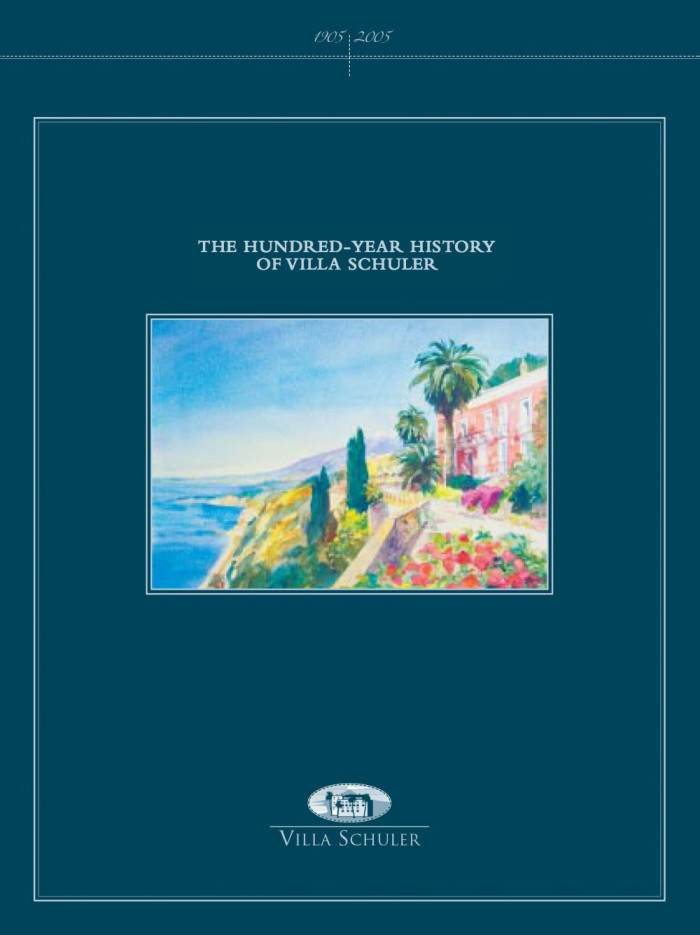

Print the Brochure in PDF format
If you haven’t Acrobat Reader, click here.
If you’re interested, over the next few pages we’ll tell you a little about the turbulent family history of the Schulers – how “Villa Schuler” survived two world wars, how our grandmother transformed the rundown building into a charming hotel in the 1950s and thus, in her modest way, laid the foundations for the present success of our father’s era.
Of course, it would be impossible to tell the story of a hotel without focusing on the most important factor: its guests. So we will also tell you something about the people who spent their holidays here over the decades. Indeed, an interesting and illustrious set of visitors joined us here from time to time. Many of our guests have valued the family atmosphere of “Villa Schuler” and have come back again and again.
Today, under our father’s management,”Villa Schuler” is in the third generation of family ownership. That makes us the oldest owner-run hotel in Taormina. And our visitors come from every continent. In these one hundred years “Villa Schuler” has become something of an institution in Sicily.
But read this story yourself!
Alessandro & Andrea Schuler,
Taormina, Spring 2005
The late 19th and early 20th century saw large waves of emigration from Germany.The daring, the adventurous or simply the desperate were leaving the country for a better life. For some, it was fashionable in those days to move abroad.These were people in a financial position to make a new start and willing to take a risk. Of course many Germans headed for the United States of America. But there were also Germans who chose Italy as their new home.Goethe’s “Italian Journey”was certainly influential in making Italy and, in particular, our home Sicily a popular destination.
Our great grandfather, Eugen Schuler senior, the son of a physician’s family from Heilbronn, was one such migrant. At the age of 20 he left his German home one day and traveled almost 2,000 kilometers southward. That was 1886. And what an incredibly long and arduous journey it must have been back then: nowadays almost unimaginable for us as young people living in the 21st century. Our great grandfather suffered from an ear infection that was difficult to treat. He heard that the mild Mediterranean climate promised at least some relief, if not a cure.With this in mind he made his way to the port of Messina in Sicily. On arrival he found that a lively German community had taken root there. Among them had been once Konrad Duden, germanist and author of the famous Duden dictionary. It was in Messina that the young Eugen was to meet his wife.
He took up an apprenticeship under a Swiss clockmaker. Apart from learning this fine craft, he developed a keen interest in photography.And it was then that he married a German woman called Anna Märklen from Asperg. In 1892 their only son – our grandfather – was born in Messina.They named him Eugen after his father.
Having completed his apprenticeship, great grandfather set up his own business selling both jewelry and timepieces. He was now very much at home in Sicily. The story told in our family is that, after a few years, Eugen senior decided to move again, this time to look for new shop premises in the south of the island. He was heading for Syracuse, but on the way stopped at Taormina-Giardini train station where he bumped into an acquaintance who suggested trying his luck in nearby Taormina. He learned that a sizeable shop had recently become vacant in the town. Great grandpa decided straight away to walk up the slope to explore the wonderful place where many years later we were to be born.
He must have loved Taormina at first sight. In any case he moved into the shop and set up business as an “antiquities dealer” – as his business is advertised in a German guidebook of 1906 (“Meyer’s Reisebücher – Unteritalien und Sizilien”). The shop’s previous owners, also Germans, had already been selling antique artefacts, under the name of “März and Successors”. The premises were large, with four shop-windows on the ground floor of the famous Palazzo Corvaja on Piazza Badia – the building, incidentally, where the Sicilian parliament of nobles had assembled in 1410 to choose a new king.
Our great grandfather ran the business with the active support of his wife, but also found time to pursue his passion for photography. In fact photography helped him to receive a high honor. It’s a story our grandmother still likes to tell us: one day the imperial yacht of the German Kaiser,Wilhelm II, was anchored off the Sicilian coast.There was talk on board of a talented German photographer who lived locally. Eugen Schuler’s reputation as a photographer must have reached the ears of the Kaiser, because he was summoned to develop pictures taken of the imperial family’s visit and to do some interpreting for Wilhelm II.
Great grandfather’s business must have been going quite well at this time, because he soon had the means to purchase some land on the town’s lower slope at Piazzetta Bastione – the same delightful spot where you are, we hope, enjoying an unforgettable holiday. The house he built here was originally intended as a home for the family. However, our great grandfather decided to add spacious shop premises to the ground floor where he could exhibit all his treasures for sale.The future must have looked rosy: a young family, a magnificent house set in a superb landscape, and a successful and well-respected business. But his luck did not hold for long. Our great grandpa never reached old age. He died in 1905 at the age of 39.
Our great grandmother Anna suddenly found herself alone – a young widow with a 12-year-old child. A shadow was now cast over her hopes and plans for the future. As a widow with a child at school, she couldn’t travel around for the antiques business. But the woman our great grandpa had chosen was not only a good wife but also had a good head for business. What did she now do with a big house in this wonderful location? Without further ado she turned it into a guesthouse! And so began the history of hotel “Villa Schuler”.
Without doubt our great grandma Anna had recognized the signs of the times: at the turn of the century Taormina had already become an attractive destination for Europeans from colder climates. Many of them liked to stay for long periods, so money was coming into the town. Although “town” was not yet the right description for Taormina. A hundred years ago it was still basically a small village with an extraordinary history. But that was all changing thanks to foreign visitors.What hastened this development was the presence of a busy little colony of artists. One of them was Otto Geleng, a German landscape painter, who came to Taormina back as early as 1868, when he was twenty. Observant visitors to Taormina may notice the street named after him. Another was the photographer Wilhelm von Gloeden: his homoerotic pictures, not to mention the wild tales that were spun around them, made Taormina a talking point, increasingly drawing the attention of celebrities, artists, writers, bohemians and intellectuals. They, in turn, acted like magnets attracting people from high society. Indeed, a number of celebrities came here to follow the footsteps of Taormina’s first ever great admirer, Johann Wolfgang von Goethe.
The list of “celebs” who over the years honored Taormina with their presence is long. To name but a few: Johannes Brahms, Guy de Maupassant, Oscar Wilde, Richard Wagner, Austria’s Empress Elisabeth “Sissi”, the British kings Edward VII and George V, Thomas Mann, André Gide, Jean Cocteau, D. H. Lawrence, Christian Morgenstern, Tennessee Williams, Truman Capote, Somerset Maugham, Greta Garbo, Marlene Dietrich, Joan Crawford, Rita Hayworth, Cary Grant, Sofia Loren, Elisabeth Taylor, Richard Burton and Christian Dior. The travelers drawn to Taormina obviously needed somewhere to stay. And quite a few wanted to stay for several weeks or months. No wonder the pension run by our great grandmother soon became a profitable business. Many of her guests belonged to Prussian nobility – after all, apart from the prominent resident artists at work here, the aristocracy was, at that time, probably the only social group who could afford to stay abroad for months on end.
An interesting glimpse of the early years of “Pension Schuler” is provided by a travel novel written in 1909, entitled “Seekers in Sicily”. The authors, the well-known American travel writers Elizabeth Bisland and Anne Hoyt, drew from the experience of their own travels around the island.”Seekers in Sicily” is a tale of two rich American ladies on a tour of a region of Europe that still seemed exotic, alien and – especially from an American perspective – deeply underdeveloped.
In the spring of 1908 the protagonists, Jane and Peripatetica, find accommodation for a few weeks in “Villa Schuler”.With affection and full of humor, they describe their impressions and their delight at the hospitality shown by our great grandmother. Today’s guests will recognize our hotel in many passages of the novel.The luxuriant garden and the distinctive terrace already existed back then.
“At the bottom of the crack a high wall and a pink gateway… they were in a delicious garden, descending a pergola of roses and grapes.Violets and freesias, geraniums and heliotrope spread in a dazzle of colour and sweetness under gnarled olives and almonds and blossoming plums; stone benches, bits of old marbles, a violet-fringed pool and a terrace leading down to a square white house, a smiling young German girl inviting them in, and then a view – dazzling to even their fatigued, dulled eyes.
In front a terrace, and then nothing but the sea, 700 feet below, the surf-rimmed coast line melting on and off indefinitely to the right in great soft curves of upspringing mountains (….) Fortunately the villa’s interior showed comfortable rooms, clean, airy, and spacious. But the terrace settled it.They would have slept anywhere to belong to that.”
Our great grandmother had just got things running nicely in the guesthouse when the next disaster loomed on the horizon: war in Europe.When the First World War broke out, German property in enemy countries was confiscated. “Villa Schuler” was no exception. Our great grandma and her son Eugen, who was now 22 years old, had to abandon the villa and flee. She made her way back to Asperg where she spent the war years. Eugen was called up to fight and reported to barracks at Karlsruhe. But he was lucky enough not to be sent to the front. A horse gave him such a kick in the knee that his injury saved him serving his fatherland in the trenches.
In April 1926 a daughter, Elisa, was born. But new life was followed quickly by death in December of the same year: Thea, our grandfather’s wife died. Elisa and Heinz now grew up with their grandmother and father. And it wasn’t long before the next great misfortune struck. At the tender age of eight Elisa died of an undiagnosed case of appendicitis. Only shortly before, the German artist Professor August Bresgen, a good friend of our grandpa’s, had painted the girl’s portrait. You will have already noticed the lovely painting, which has hung ever since that time in our breakfast room.Our grandfather Eugen’s luck continued: in the military hospital he got to know a nurse from Hamburg called Thea Andersen, who agreed to be his wife. The two married and before long a baby was on its way: in 1921 Heinz was born – in Taormina! Returning with his wife and his mother to Taormina, our grandfather took the risk of making a fresh start. This venture wouldn’t have succeeded without something very remarkable happening. After the First World War, the expropriated “Villa Schuler” was to be sold off by auction, but local bidders came together and agreed to withdraw their offer in favour of our grandfather. Clearly his parents had not only acquired a good reputation in Taormina but some good friends, too.The way was now free for grandfather Eugen Schuler junior to repossess his old parental home. As the only bidder he purchased the family heirloom. Very soon the pension above the sea was doing good business again. The guests had stayed loyal to “Villa Schuler” and began returning for their holidays. And perhaps we should mention at this point that in the 1920s and 30s foreign visitors had a very different approach to their vacations from that of today’s tourists. Back then the guests would arrive in the autumn and spend the winter on the island until May or June of the following year. That brought secure bookings. This pattern of traveling and lodging was not to change until advances in transportation enabled people to reach their destination much faster and more comfortably.
Nobody was able to anticipate then that another world war would follow the first.Yet just 21 years after the armistice of 1918 the scene was set for the outbreak of the Second World War. And once again the existence of “Villa Schuler” stood on a knife edge. Again the villa was expropriated.
In the Second World War many people were forced to realize that there was no limit to the extents of human suffering, brutality and destruction. Like an inkwell spilling over, National Socialist aggression poured across continental Europe, spreading out as far as North Africa. The National Socialists set up their positions all over Europe, including Taormina. And what could have been better in a foreign country than to find a “German house” right there. The villa was expropriated and subordinated to the war aims of the Germans. From then on “Villa Schuler” served as a liaison centre for the German army. Our grandfather joined the Nazi party and found himself lodging Nazis like Dr. Robert Ley and his entourage whenever they happened to be staying in Taormina. The busy life of “Villa Schuler” as a hotel had ended abruptly for a second time
When the German military moved out of “Villa Schuler” in 1943, following the liberation of Sicily by the Allies, it was occupied by the British army. Our grandfather and his mother fled to Bolzano (Bozen) in the Alps. Appreciating the building’s spectacular location, the British turned the hotel into a rest home for soldiers stationed on Malta. This change of function brought a number of alterations. Our grandfather had gradually improved the villa with the hotel business in mind – in 1938, for example, he had an extension built towards Piazzetta Bastione and added a series of balconies. The British had the balconies bricked in because, it is said, a drunken soldier fell over the balustrade and died.
When the British left “Villa Schuler” the building must have been in a frightful state. The wiring and plumbing had been ripped out and many of the rooms smashed. The anger created by the war was vented on “Villa Schuler” because it was the house of a German family. Happily, that is now history. Today, the British commanding officer at the time,Mr. Robinson, is one of our guests.
The Italian authorities, who now owned the ruins of “Villa Schuler”, put the management of the premises into the hands of the “Banco di Sicilia”. The bank relocated bombed-out civilians and homeless Taorminesi to the empty rooms. The same villa that had once offered its comforts to Prussian aristocrats and other wealthy visitors now became temporary accommodation for the inhabitants of Taormina who had lost their homes in the war. As was the local custom, chickens were kept on the roof-garden and rabbits were reared on the palm terrace. And what did our grandpa do? To secure a living for himself and his mother, he returned from Bozen and found a position as manager of the “Grande Albergo dell’Etna”, over on the southern side of Mount Etna near Nicolosi. But his luck was to turn again in 1952.
The Second World War was over. Once again people began to take stock, reorientate and build a new life. Our grandfather did the same. He apparently couldn’t and wouldn’t give up his parents’ home. It would certainly have been too late for him to start a new life in Germany, his father’s country of origin. By now he was 61. So he approached the Italian authorities and managed to reach an agreement to have the family’s property returned for a second time. This time he got it back in ruins but free of charge. And so, in 1953 “Villa Schuler” was returned to our rightful ownership. It was a family milestone that his mother never lived to see. She had died in 1949.
The situation must have been sad and forlorn: grandfather now lived in a brokendown house together with a maid, his now 32 year-old son, Heinz, and Heinz’s wife – and with lots of memories of happy and successful times. Our step-uncle Heinz made it clear from the outset that he had no interest in running the hotel under those circumstances. Instead he decided to become an electrician and moved later with his wife to Messina, where he specialized in planning and setting up large electrical installations. For our grandfather, starting a hotel from scratch was a task simply too big to take on. In any case, no real progress was made for a while. In a period when our grandpa must have been beset by gloomy thoughts, the answer to his problems was already close at hand. He was soon to meet her: our grandmother Marta.
Change of scene: Germany just after the war. Our grandma, a determined young woman who could take life’s ups and downs in her stride,was living in the German Kraichgau hills. One day she decided to give up her job and leave home – a remarkably brave step to take at a time when most people longed for nothing more than stability and security. Born in 1923, our grandmother belonged to a generation whose teenage years had been spent under a brutal and inhuman regime and under war conditions. She’d had to wait a long time to get a chance to train as a nurse – the profession she had always dreamed of. Life as a student nurse was hard, the work routines strict and exhausting. The combination of heavy responsibility and a deep concern for her patients pushed her to the limits. Eventually she fell ill with stomach ulcers.
Repeated treatment in sanatoriums brought no improvement. It was in this situation that a senior doctor came up with a suggestion that would change her life. Later she would say it was the hand of fate. The doctor was a friend of a wealthy family whose daughter had contracted tuberculosis and needed a private nurse.The assignment was at an unusual location:Taormina in Sicily.
Just imagine – in the 1950s the journey from Germany to Sicily would still have seemed like travelling half way round the world. But Marta, our intrepid grandma, set off for a world completely beyond her experience.At first she planned to stay for a year. But, as you will have already guessed, it didn’t turn out that way. Marta’s patient was married to the director of the local electricity works, Nino Bolognari.Our grandpa was a friend of the Bolognaris and regular visitor to their home. He soon got to know Marta. The two married in 1954. Between them an age gap of 31 years – and before them a shared future in “Villa Schuler”.
That’s how it can happen. Our grandmother Marta changed her profession from one day to the next – yesterday nurse, today hotel manager. In fact the new job required the same underlying human quality: the ability to take pleasure in helping others. Our grandma now realized that this would become her life’s work.
The villa was in a desolate condition. There was only one thing to do: smile and get on with it.With a few workers from the town, our grandparents set about repairing and restoring the old building bit by bit. It didn’t take long before the hotel could open again, at first with fourteen rooms. That was hard work in the mid-1950s. In the first five years they didn’t have a single domestic electrical appliance – unimaginable today! The standard was still rather modest, but nobody seemed to mind renting a room with “hot and cold running water”. After what people had gone through during the war, our grandparents’ hotel must have been paradise on earth. At least that’s the impression we get from the entries in the old visitors’ books. As if a sudden interruption in the life of a hotel had been perfectly normal, the tourists returned. Word of “Villa Schuler” spread mainly by word of mouth.
Some of the children of visitors from the 1920s were now spending their holidays here. In those days the aristocrats from Eastern Prussia preferred to travel incognito. However, we know that distinguished names like von der Schulenburg, Baroness Rietesel, Baroness Gorup and Baroness Gablens came to stay. Our grandmother learned first-hand some of the stories of German resistance to Nazi rule. The widow of Carl Friedrich Goerdeler, one of the leading figures behind the plot to assassinate Hitler on 20th July 1944, spent some time in the hotel accompanied by a younger relative. Other prominent guests in the immediate post-war years were the famous German philosopher Theodor W. Adorno, the Austrian dramatists Thomas Bernhard, the liberal politician Thomas Dehler and the actress Elke Sommer.
But people’s approach to travel was changing radically in the 1950s. Direct train links between Germany and Italy made the journey fast and comfortable by the standards of the time. More and more guests now chose Taormina for their summer vacation. The times when guests would reside here for the long winter months were never to return.
There was still no modern marketing as we know it today. A hotel had a good name – or it didn’t. That was one of the reasons why grandpa kept in close touch with German consulates and members of the German embassies around the world. Many of his guests came on the recommendation of someone in the diplomatic service. Grandma still likes to talk about her personal acquaintances, how she knew every German consul in Italy. The visitors’ books from those years have survived. They represent a unique historical document and bear impressive witness to the success of this “advertising strategy”. Our visitors included an unusually large number of German civil servants, mayors, judges, privy councils and senators. The German navy also make an appearance on the pages: “We lay at your feet for three days”, wrote the captain of the German training regatta “Brommy” in 1961. The ship lay at anchor in the bay with “Villa Schuler” in view up above. The hotel business was thriving again, so our grandparents decided it was time to extend the building – the 3rd floor was pulled down and rebuilt.
Our grandma ran the hotel with the help of a German nanny and three domestic servants. In 1954 our father Gerhard was born, and in 1957 his brother Claudio. Quite a handful for our grandmother.While grandma was busy, grandpa gradually withdrew from an active role in the business and dedicated his older years to his burning passion: Mount Etna.
Both great grandfather and grandfather had always been gripped by Etna’s fascination. Both accompanied scientists up to the volcano rim. They documented the changes occurring over the years to Europe’s biggest active volcano. Even today our grandfather’s name still rings a bell among the Etna mountain guides. He made regular walks to the volcano and became an aknowledged expert at the Volcanological Research Institute in Catania. Guests who mentioned a strong interest in Etna would sometimes be invited to join one of his expeditions or he would give them a slide show and lecture in the hotel. Our grandfather died in 1975 at the age of 82. He found his final resting place here in his beloved Taormina.
Grandma often tells us how she developed personal friendships with her guests. From time to time she would join in their celebration of birthdays or wedding anniversaries. In the old days, she says, people had more time. There was more space for the personal touch, including a closer relationship with the staff. Anna di Camillo, one of our maids, worked here for more than thirty years – and she is now part of the family.The story of “Villa Schuler” is not only that it survived two expropriations; it also documents the remarkable development of tourism in the 20th and 21st century.
The 1970s saw the rise of mass tourism. Holidaymakers could choose between destinations all over the world. So the profile of our guests changed, becoming much more international. Our grandma ran the hotel until the end of 1983 and then passed on the business to her sons Gerhard and Claudio. Some years later our uncle Claudio took over our family’s holiday apartments which are situated in Taormina’s residential area “Chiusa”. Since then our father has been running “Villa Schuler” by himself.
Our father’s background as a student of languages in Germany has fitted perfectly with the demands of the new internationalism. Since the hotel management has been in his hands, a great deal has changed.Today in 2005, the year of our 100th, we have a total of 27 rooms and suites. And we have a staff of ten to make sure “Villa Schuler” runs smoothly 24 hours a day. The hotel building has been modernized with a number of additions to offer you the high standards and comforts that will make your stay a pleasant one.Yet while making all these changes, our father has preserved and cultivated the tradition of “Villa Schuler” as a matter of great personal importance.
Speaking as the youngest Schulers, but also in the name of the whole team, it is our wish that the villa’s unique spirit will remain a tangible part of our guests’ experience long into the future.We will always be delighted to welcome you again in “Villa Schuler”, a villa with a really extraordinary history.












